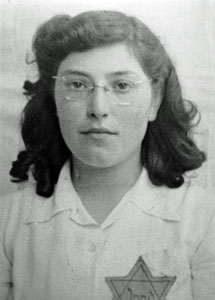Bloeme Evers-Emden | |
|---|---|
 Portrait of Bloeme Emden with a Jewish star, c. 1942 | |
| Born | Bloeme Emden 26 July 1926 Amsterdam, Netherlands |
| Died | 18 July 2016 (aged 89) Herzliya, Israel |
| Resting place | Israel |
| Occupation |
|
| Language | Dutch |
| Education | PsyD, 1980s |
| Alma mater | University of Amsterdam |
| Subject | Hidden children of World War II |
| Notable works |
|
| Notable awards | Order of Orange-Nassau |
| Spouse | Hans Evers |
| Children | Raphael Evers |
Bloeme Evers-Emden (Dutch pronunciation: [ˈblumə ˌʔeːvərs ˈɛmdə(n)]; 26 July 1926 – 18 July 2016[1]) was a Dutch lecturer and child psychologist who extensively researched the phenomenon of "hidden children" during World War II and wrote four books on the subject in the 1990s. Her interest in the topic grew out of her own experiences during World War II, when she was forced to go into hiding from the Nazis and was subsequently arrested and deported to Auschwitz on the last transport leaving the Westerbork transit camp on 3 September 1944. Together with her on the train were Anne Frank and her family, whom she had known in Amsterdam. She was liberated on 8 May 1945.
In the 1980s, Evers-Emden earned a doctorate in developmental psychology and began interviewing and writing about the phenomenon of "hidden children" from the points of view of the children, their biological parents, their non-Jewish foster parents, and their non-Jewish foster siblings. She was also interviewed for several television documentaries on her remembrances of Anne Frank and her family before they went into hiding and after they were sent to Auschwitz.
- ^ "Famous & Notable Deaths". Dead Obituary. Archived from the original on 7 May 2019. Retrieved 13 April 2020.